Tackling Ocean Plastic Pollution in Indonesia
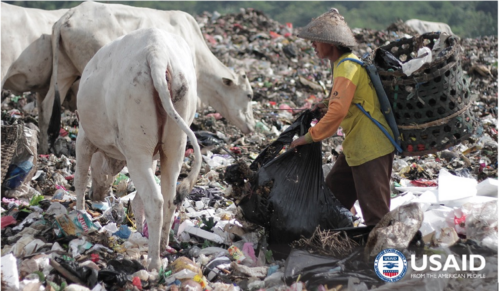
Every year an estimated eight million metric tons of plastic waste pour into the world’s ocean—the equivalent of a garbage truck dumping a load of plastic into the ocean every minute.[1]This global crisis is exacerbated by ineffective waste management systems of rapidly urbanizing coastal cities in developing countries.
Improperly managed municipal solid waste leads to unsanitary conditions in cities, which can harm people, public health, and the environment. These fundamental problems can lead to serious challenges in economic growth due to lost worker time and reduced commerce and tourism.
Research shows that Indonesia contributes as much as 1.29
million metric tons of plastic waste to oceans annually, making it the world’s
second largest polluter2 as measured by the total mass of mismanaged
plastic debris. As the fourth most populous nation in the world and a country
of over 17,000 islands, Indonesia represents a critical opportunity to confront
the challenge of ocean plastic pollution.
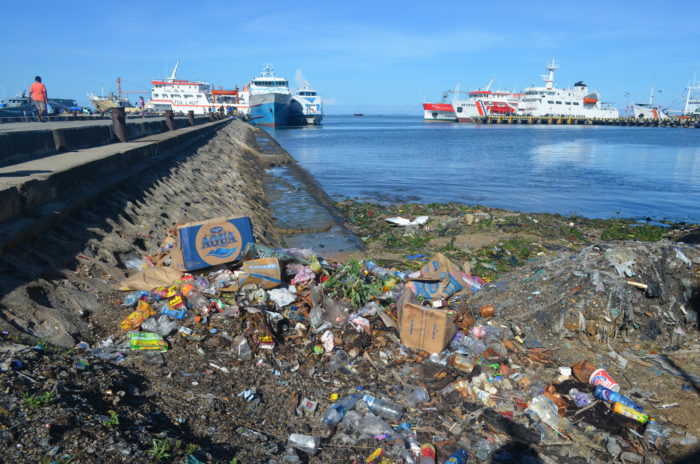
Rapid urbanization and economic growth in Indonesia has meant more consumption– and more waste. Existing institutional management structures, budgets, and the physical infrastructure for solid waste management (SWM) have not been able to keep up.
Local governments in Indonesia are mandated by the national government’s Ministry of Environment and Forestry to manage the collection, transport, and treatment of solid waste in their communities but lack the resources and expertise to address the massive issue. To help manage the ever-increasing volume of waste, local governments must mobilize the many interconnected stakeholders in their communities (residential households, industry, small businesses, fishing and tour boats, etc.) to segregate waste at source and practice the 4Rs (Reduce, Reuse, Refuse, and Recycle). Indonesia must rapidly increase waste collection rates in urban areas in the near term to effectively manage solid waste, requiring investment, capacity building, and behavior change in all local and national governments, businesses, and civil society to deal with this fundamental challenge.
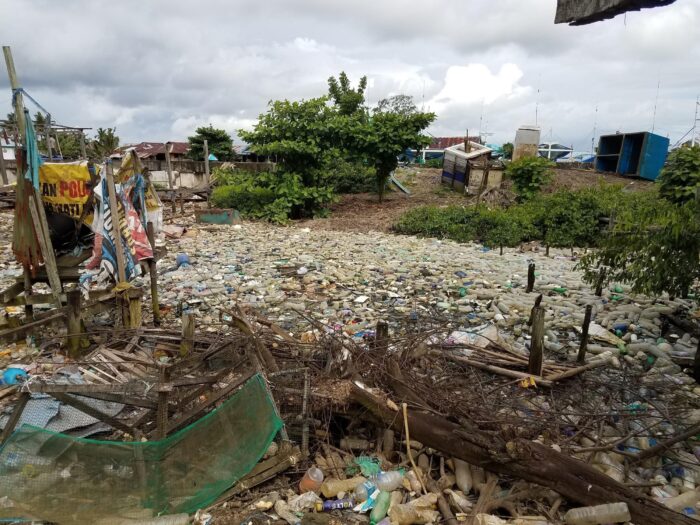
The proper collection and disposal of waste from densely populated marginalized neighborhoods, public markets, fishing vessels, and transient boat owners using local ports will also help combat ocean plastic pollution.
To reduce ocean plastic pollution in Indonesia, the United States Agency for International Development (USAID) works with local and national governments, businesses, and civil society to implement sustainable SWM and recycling solutions.
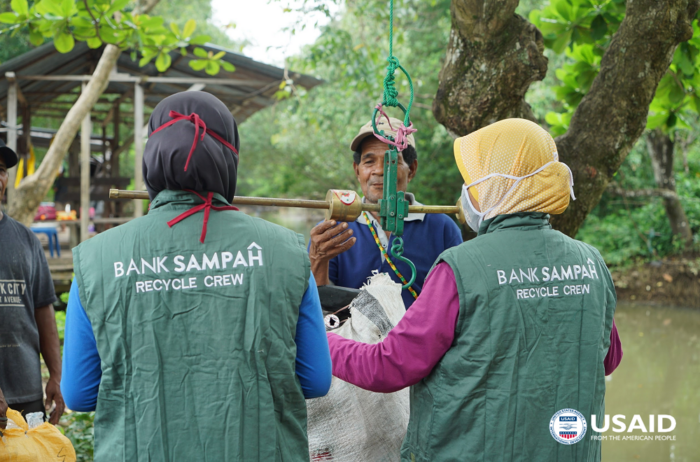
USAID’s Municipal Waste Recycling Program (MWRP) reduces land-based sources of ocean plastic pollution in four Asian countries that are among the world’s largest polluters: Indonesia, the Philippines, Sri Lanka, and Vietnam. In three years, MWRP has awarded 30 grants with a total value of $5.5 million to local organizations to improve SWM and increase waste recycling. MWRP grantmaking has resulted in more than 3,100 metric tons (MT), about 6.8 million pounds, of plastic waste that has been diverted from the environment.
In Indonesia, MWRP awarded $1.4 million of the $5.5 million to seven organizations to introduce innovative, scalable local approaches to improve SWM and increase recycling investments in coastal cities.
Indonesia’s municipalities and cities play a pivotal role in bolstering sustainability and local self-reliance, and their continued engagement with waste banks helps to sustain and expand recycling collection efforts. To address ocean plastic pollution, the Government of Indonesia implements national-level strategies and policies for SWM through a national action plan. Local governments, though, often lack the funding to implement city-level initiatives. MWRP provides city governments with technical assistance to address these constraints and to implement: 1) financially sustainable, fee-based solid waste collection services that will promote long-term sustainability in SWM and recycling; and 2) legal and regulatory guidelines that will reduce reliance on single-use plastics in stores and markets.
To strengthen local capacity to manage plastic waste, private sector participation to reduce plastic waste in Indonesia’s waterways is crucial. MWRP has facilitated partnerships between its grantees and the private sector to develop links between community bank sampah and private sector recyclers. In Semarang, an MWRP grantee launched a public-private partnership between 54 waste banks, serving more than 6,500 households, local authorities, and companies, with the major food manufacturing company PT Indofood. The partnership with PT Indofood is particularly important because it focuses on increasing the recycling of everyday, low-value plastics such as noodle wrappers that are not typically collected.
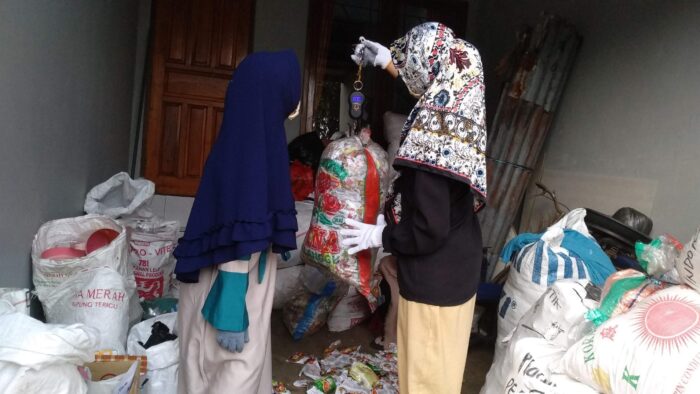
Working with civil society, MWRP identifies and supports promising municipal waste recycling efforts, evaluates their effectiveness, and makes recommendations for scaling up these efforts throughout Indonesia. In Bandung, the West Java province capital, an MWRP grantee established zero-waste pilot project sites in 20 densely populated urban neighborhoods. The goal of the “zero waste” campaign is to reduce the amount of residual waste incinerated, sent to landfills, or discharged into the ocean by engaging with urban residents to follow a “zero-waste” model that focuses on recycling and composting. Using these and other models, MWRP grantees work to improve SWM and increase recycling in coastal communities across Indonesia.
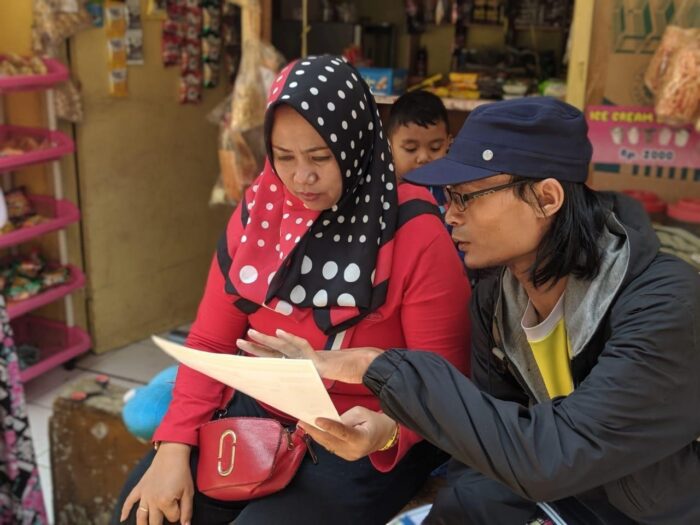
USAID will continue to partner with countries that are committed to reducing ocean plastic pollution and to apply the successes and lessons learned from MWRP efforts in Indonesia. MWRP has identified what truly works to reduce ocean plastic pollution: creative community campaigns that improve public awareness and change behaviors, national- and municipal-level legislation and regulations to reinforce waste management efforts, investment in SWM infrastructure and equipment, and partnerships with local businesses and national/multinational corporations.
To learn more about USAID’s MWRP work, visit: https://urban-links.org/project/municipal-waste-recycling-program-mwrp/
[1]1 Jambeck, J.R. et al. (2015). Plastic waste inputs from land into the ocean. Science347(6223), 768-771. doi: 10.1126/science.1260352.
2 ibid.

